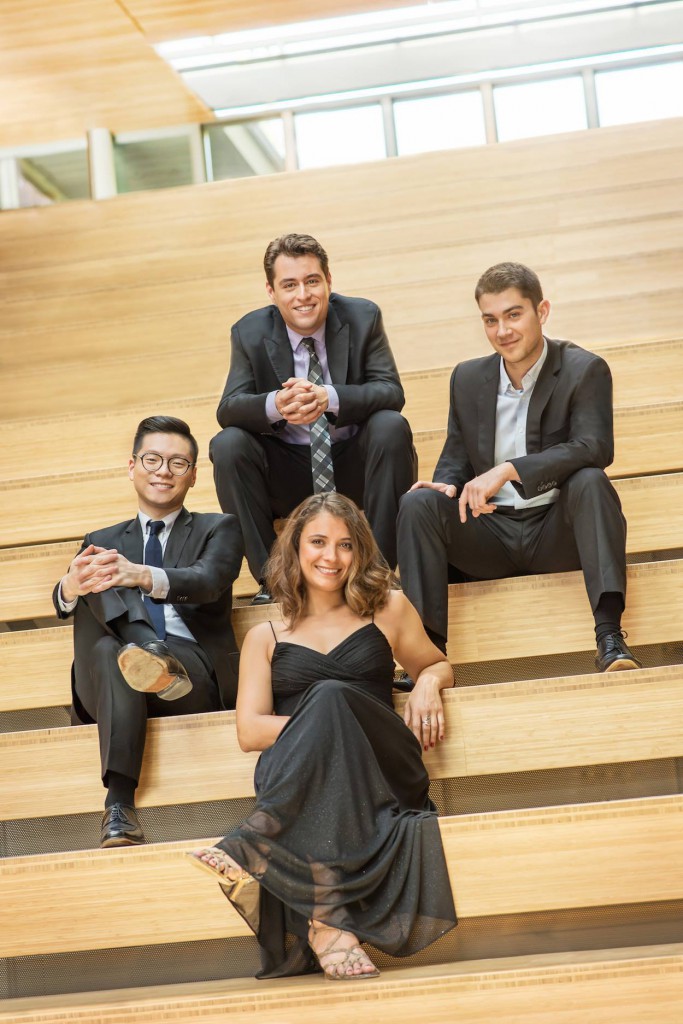Dover Quartet shows top-flight artistry in Celebrity Series debut
The Dover Quartet is on a roll.
After capturing top honors at the Banff International String Quartet Competition in 2013, this relative newcomer to the chamber music scene has experienced a meteoric rise. Further prizes, such as the Cleveland Quartet Award (2015) and coveted Avery Fisher Grant (2017), have thrust these talented musicians into the spotlight, where they continue to receive wide acclaim.
After listening to the ensemble in their Celebrity Series debut Wednesday night at Pickman Hall, it was easy to hear why this foursome is so lauded. The musicians—Joel Link (violin), Bryan Lee (violin), Milena Pajaro-van de Stadt (viola), and Camden Shaw (cello)—are together a rare musical combination of power and beauty, and they play with the sensitivity and authority of great quartets of the past and present. Their combined tonal richness recalls the Guarneri Quartet—one of Dover’s inspirations—and the players even possess the fluent ensemble blend and precision of such seasoned groups as the Emerson Quartet.
The Dover Quartet is also adventurous and versatile. Their program Wednesday night combined an early composition by Mason Bates with the final string quartets of Tchaikovsky and Dvorák.
Bates’ music has become something of a specialty for the Dover musicians. Currently, the composer and quartet are artists-in-residence at the Kennedy Center, where they have collaborated on projects that mix traditional classical repertoire with electronic dance music.
Bates’ unique compositional voice blends age-old genres and structures with the rhythmic punch of techno and electro-pop (Bates is also a DJ). Yet From Amber Frozen, a string quartet from 2004 heard Wednesday night, forgoes any literal references to such sources. In its fifteen-minute length, this sparkling gem packs a dramatic punch. Energetic pizzicatos set a side-winding pulse, and bluesy passages bring a down-home feel to Bates’s familiar rhythmic designs.
In Dover’s hands, Bates’ tuneful shards and fragments flowed together as an organic whole. The pixelated melody, spliced and scattered throughout the ensemble, coalesced into shimmering harmonies at work’s center, where the Dover Quartet unfolded them in silvery, arresting tones. The closing section recalls the opening in an even more abstracted way, and the players found a sly humor in Bates’ glassy string slides and percussive hits (the musicians are called upon to tap rhythms on the bodies of their instruments).
That focused attention to shifting timbres is also what made Dover’s performance of Tchaikovsky’s String Quartet No. 3 so attractive.
This last of the composer’s three string quartets is a deeply personal expression of friendship and grief. Dedicated to Ferdinand Laub, a Czech violinist who had a part in premiering Tchaikovsky’s first two string quartets, the score is by turns lush and radiant.
The Dover Quartet mined all of the expressive subtleties and dynamic nuance from each page. The slow introduction is an ode to Laub, and violinist Joel Link floated a tender melody over gently plucked accompaniment. The lines of the ensuing Allegro were woven into a dense, almost orchestral sonic fabric.
The second movement had the churning intensity of a Beethovenian Scherzo, while the finale, a Russian dance, took on a rustic vigor.
Yet the highlight of this performance was the third movement. With muted strings that resulted in distant harmonies, the musicians sculpted the funereal lines with solemnity. Throughout, the Dover musicians played as a solid cohesive unit, and their robust attacks brought a slight sense of agitation without the roughness of tone so often experienced in performances of this quartet.
Dvorák’s String Quartet No. 14, Op. 105, which came after intermission, had the same finesse and emotional gravity.
The question-and-answer passages that pepper this composer’s final string quartet flowed congenially. Yet the musicians injected fire and passion into this reading. In the spirited first-movement Allegro, the quartet’s dusky sonority was well attuned to Dvorák’s folk-inflected idiom.
The Scherzo had the smooth grace of a ballroom dance; the Trio, with its soaring melodies, provided lyrical complement. But the ultimate strengths of this performance rested in the refined details. The Dover Quartet shaped the soft lines of the third movement with sudden crescendos, which allowed the ensemble’s deep amber tone to glow warmly. In the finale, cellist Camden Shaw traded dry but searching phrases with his colleagues, the resulting strains flowing together like a true conversation among friends.
The Celebrity Series will present pianist Leif Ove Andsnes in music by Schumann, Bartók, and Janáček 8 p.m. January 18 at Jordan Hall. celebrityseries.org; 617- 482-6661
Posted in Performances





